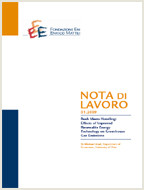Corruption and Social Interaction: Evidence from China

08.01.2011
Bin Dong, Benno Torgler
K420, D720, D640, O170, J240
Corruption, Social Interaction, China
Economy and Society
Gianmarco I.P. Ottaviano
We explore theoretically and empirically whether social interaction, including local and global interaction, influences the incidence of corruption. We first present an interaction-based model on corruption that predicts that the level of corruption is positively associated with social interaction. Then we empirically verify the theoretical prediction using within-country evidence at the province-level in China during 1998 to 2007. Panel data evidence clearly indicates that social interaction has a statistically significantly positive effect on the corruption rate in China. Our findings, therefore, underscore the relevance of social interaction in understanding corruption.
***
Suggested citation: Bin Dong, Benno Torgler, Corruption and social interaction: Evidence from China, Journal of Policy Modeling, Volume 34, Issue 6, November–December 2012, Pages 932-947, ISSN 0161-8938, http://dx.doi.org/10.1016/j.jpolmod.2012.04.005
